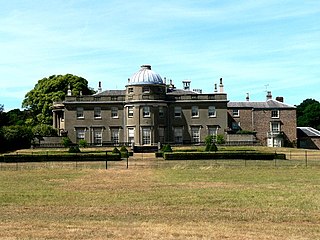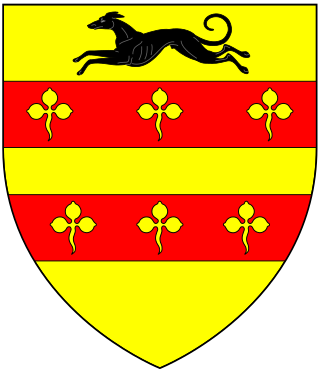Related Research Articles

The Seigneur of Sark is the head of Sark in the Channel Islands. "Seigneur" is the French word for "lord", and a female head of Sark is called Dame of Sark, of which there have been three. The husband of a female ruler of Sark is not a consort but is jure uxoris a seigneur himself.

Viscount Boyne, in the province of Leinster, is a title in the Peerage of Ireland. It was created in 1717 for the Scottish military commander Gustavus Hamilton, 1st Baron Hamilton of Stackallan. He had already been created Baron Hamilton of Stackallan, in the County of Meath in 1715, also in the Peerage of Ireland. Hamilton was the youngest son of Sir Frederick Hamilton, youngest son of Claud Hamilton, 1st Lord Paisley, third son of James Hamilton, 2nd Earl of Arran. His grandson, the second Viscount, represented Newport in the House of Commons. His first cousin, the fourth Viscount, sat as a member of the Irish House of Commons for Navan.

John Smith (1656–1723) of Tedworth House, Hampshire, was an English politician who sat in the English and British House of Commons between 1678 and 1723. He served as Speaker and twice as Chancellor of the Exchequer.
Robert Bertie, 3rd Earl of Lindsey PC FRS, styled Lord Willoughby de Eresby from 1642 to 1666, was an English nobleman.
Thirsk was a parliamentary borough in Yorkshire, represented in the English and later British House of Commons in 1295, and again from 1547. It was represented by two Members of Parliament until 1832, and by one member from 1832 to 1885, when the constituency was abolished and absorbed into the new Thirsk and Malton division of the North Riding of Yorkshire.

Sir William St Quintin, 3rd Baronet, of Harpham in Yorkshire, was an English merchant and Whig politician who sat in the House of Commons from 1695 to 1723. He held a succession of public offices.

There have been twenty one baronetcies created for persons with the surname Williams, eight in the Baronetage of England, three in the Baronetage of Great Britain and ten in the Baronetage of the United Kingdom. Only six of the creations are extant as of 2017.

William Bromley of Baginton, Warwickshire, was an English Tory politician who sat in the English and British House of Commons between 1690 and 1732. He was Speaker of the House of Commons of Great Britain from 1710 to 1713 and Secretary of State for the Northern Department from 1713 to 1714.

Stagenhoe is a Grade II listed stately home and surrounding gardens located in the village of St Paul's Walden in Hertfordshire. It is approximately 6 miles (10 km) south of Hitchin. It was the family seat of the Earl of Caithness. Socialite Lady Euphemia Sinclair spent her childhood there and became a friend of Queen Elizabeth the Queen Mother, whose family were neighbours.
The Right Honourable Frederick Hamilton was an Irish politician who represented County Donegal in three Irish parliaments. He was also heir apparent to his father, Gustavus Hamilton, 1st Viscount Boyne. He predeceased him but his son succeeded as the 3rd viscount.

Sir Thomas Palmer, 4th Baronet, of Wingham was a British landowner and Whig politician who sat in the House of Commons between 1708 and 1723.
The Governor of Chester was a military officer responsible for the garrison at Chester Castle. The equivalent or related role from the 11th to 14th centuries was Constable of Chester.
Sir John Austen, 2nd Baronet was an English landowner and politician who sat in the House of Commons at various times between 1667 and 1699.
Sir Thomas Scawen was a British merchant, financier and Whig politician who sat in the House of Commons between 1708 and 1722. He was Governor of the Bank of England from 1721 to 1723.
John Deacle, of Wingrove, Buckinghamshire and Aldermanbury, London, was an English politician who sat in the House of Commons from 1715 to 1722.

The Chaplain to the Speaker of the House of Commons, also known as the Speaker's Chaplain, is a Church of England priest who officiates at services held at the Palace of Westminster and its associated chapel, St Mary Undercroft. The Chaplain also acts as chaplain to the Speaker and Members of Parliament. The first Speaker's Chaplain was appointed in 1660. The current officeholder is Patricia Hillas.
John "Vulture" Hopkins was a British merchant of London and a Whig politician who sat in the House of Commons from 1710 to 1722.
Sir Charles Hotham, 4th Baronet, of Scorborough and later of Beverley and South Dalton, was a British Army officer and Whig politician who sat in the English House of Commons and British House of Commons from 1695 to 1723.

William Drake (1723–1796), was a British politician who sat in the House of Commons for 50 years between 1746 and 1796, eventually becoming Father of the House.